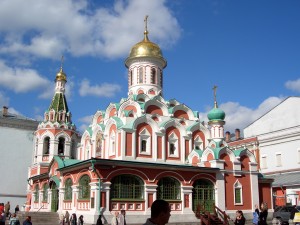This week in America Magazine, Thomas A. Massaro calls on his fellow American to lay down their car keys and get in line for a Metro Card. He concludes:
I hesitate to recommend breaking entirely with the automobile. But to avoid the folly of getting stuck in unsustainable patterns of living, we must face up to the imperative to renegotiate the relationship. Since our reliance on gas-guzzling vehicles is not serving us well, it is time to challenge our overly car-centric culture.
And then he puts on a pair of Reeboks, like President Carter slipping on a sweater. At any rate, that’s what I picture him doing. But really, I can afford not to be defensive here. If there’s one thing in my life I can truthfully say is Christian through and through, it’s my relationship to the internal combustion engine. Growing up in Manhattan, I spent no time at all tinkering with cars. When, after four years in Arizona, I finally got my driver’s license — in pursuit of which accomplishment I was not required to learn to parallel-park — I lacked the instinctive understanding of engines and head gaskets and catalytic converters that spares most men (and, hopefully, increasing numbers of women) fleecing by salesmen and mechanics.
My rides tended to break down quickly, and before long, it seemed, irreparably. One or two I sold for scrap when maintenance costs threatened to exceed the sticker prices. As a result, I came to feel an detachment from motor vehicles that verges on the monastic: easy come, easy go. Sic transit gloria Mazdae. Owning a car came to seem more like a nifty extra, like a Tag Heuer watch some sweet and senile relative might give as a Christmas gift — not like a necessity.
But life requires mobility. Until us humans learn to photosynthesize, we’ve got to get around somehow. Thomas Massaro urges transportation officials to ”continue to enact positive measures to enhance reliable public transportation and encourage pedestrian-friendly zones.” I can assure him most Arizonans would treat him real ugly, in Rick Perry’s words, even for suggesting such a thing.
The metro Phoenix area sprawls like a harlot on laudanum; it offers endless blue sky, but almost no skyline. It does have a bus system, and more recently installed a light rail, or monorail, that runs from downtown Phoenix eastward into Mesa. But their use is still largely confined to the underclass. In New York City, you can find stockbrokers riding the subways. On a Valley city bus, you’ll see mainly people on their way — if they’re lucky –to dead-end jobs. They look shabby, tired and defeated. The sight of passengers boarding or alighting looks like a late-medieval representation of the danse macabre — a study in the decline and decay of human flesh and aspiration.
Now, a Jesuit like Thomas Massaro might well find this sort of thing very edifying. To someone such as I’ve been — a layman with a low-level office job and an stubbornly Calvinistic view of wealth and its absence — it feels a little like the Ludovico Treatment in A Clockwork Orange. Gaze upon the wages of your sins: These wretched husks of humanity are your peers. Their present is your future. Believe me, this is no way to start a productive day.
But there are options. One of them is walking — a habit any Manhattanite gets into early. Since Phoenix is anything but compact, no one would think to call it a walker’s city; but if you happen to have five or six miles in your legs, it can be a paradise. You’ll find you’ve got almost the entire pavement to yourself– certainly there won’t be any jostling Midtown crowds. Major intersections occur at intervals of a mile, so there’s no need to choose between sudden, maddening halts and dashes through traffic.
Heat is an issue, no doubt about it — at least from June through early September. But even in those terrible months, it doesn’t become painful until around nine in the morning. Even after that, it is beatable, given a hat, shades, synthetic fibers and bottled water. And if you’ve got my Snoopyish imagination, it helps to imagine yourself as T.E. Lawrence, attacking Aqaba by land, against Omar Sharif’s almost hysterical warnings.
Then there’s biking. The advantage is obvious — you get in shape. The disadvantage lies in the same direction — to pull it off, you have to want to be in shape. There are other complications. If you are young and live in a college town, or in an upscale area like Scottsdale, you can amble along on a single-speed beach cruiser without compromising your dignity. Otherwise, in order to be taken for a serious individual, you have to invest in all the class signifiers — the Trek road bike, the lycra shorts, the helmet, the clip-in shoes. Together, they will more than likely run well into the four figures, or nearly the price of a used car.
But then, maintenance costs, barring accidents, are minimal. Barring strong headwinds, you can easily reach a speed of 30 mph. If a hiring manager should ask whether you’ve got “reliable transportation,” you won’t have to mumble, “I ride a bike,” meaning, “I’m a flake.” Instead, you can state primly, “I’m a cyclist,” meaning, “I’m yuppie scum, and perfectly entitled to the secret handshake.”
But cycling, unlike walking, is no fit occasion for daydreaming. I learned this on the morning of Friday, September 13, 2002, as I was pedaling my way furiously to the mortgage company. Approaching a small swale about a quarter-mile north of the Mill Avenue Bridge, I ducked my head to reduce drag. Since it was a stretch of road I’d ridden over every day for the past three years, I kept my eyes lowered for about 90 seconds. My mind must have been elsewhere. (The prime rate? Britney and Justin? Hans Blix and Dominique de Villepin? Who knows?) In any case, when I looked up, I saw one of those orange signs, reading “ROAD WORK AHEAD,” looming in my path.
I squeezed the brakes; the bike stopped; I didn’t. Flying over the handlebars, I managed to clip the edge of the sign with one of my thumbs, leaving a fair-sized scrap of skin behind. Landing on the inside of my arm and my hip, I skidded for what I later estimated to be seven or eight feet. The impact left me with a fetching hole in my lycras and a less fetching one near my elbow, which eventually closed with a scar that remains visible to this day.
But chicks dig scars, or so they say. The souvenir of my next and worse cycling-related accident can have endeared me to nobody. One morning, I arrived at the brokerage, locked up my bike, and hustled off to the men’s room to change into my office wear. As I removed my biking shorts, I noticed that they were not as clean as they might have been. And that’s putting it very mildly. Horrified, I hid them in my knapsack, resolving to wash them before the next wearing.
The day happened to be a Thursday — the day of the weekly team-builder, where the entire sales floor would descend on a college-type bar called the Vine, get smashed on Rolling Rock, and pass out our business cards to any girl who looked morally stunted enough to want to seek her fortune in mortgages. Someone drove me and my bike there; I decided my bike and I had better take a cab home. When I finally made it inside my apartment, I realized I’d left my knapsack in the cab. Between calculating the tip and dragging my bike out of the trunk, I’d simply forgotten about it. My shorts were inside.
The next morning, I called the cab company, telling myself that the driver must have taken only the smallest peek inside. But when I described my knapsack to the dispatcher, I heard a leer of triumph come into his voice. His exact words were, “Yes, we’ve got it, but we’re not responsible for it. You can come down if you like, but I can’t promise it’ll still be there.” What I heard was: “This is the American dream I have pursued all the way from my native Eritrea — to look after the soiled sportswear of unsuccessful capitalists who cavort in bars? Feh on you!” I walked to work in business casual that morning.
You’ll say I’m projecting — that the odds of some harried cab dispatcher sharing my obsessive and outdated class consciousness are next to nil. Maybe. But even if he didn’t think that, he should have — there’s too much gorgeous symmetry in it. If riding the bus is like contemplating a grim medieval woodcut, then proudly pumping around town on a designer road bike ought hold its own terrors — some Dante-ish scene where the sinner is overcome by consciousness of his own filth.










